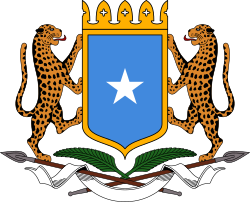 |
|---|
|
Parliamentary elections were held in Somalia on 26 March 1969. A total of 64 parties ran in the election, many of which had been formed shortly beforehand. [1] The result was a victory for the Somali Youth League (SYL), which won 73 of the 123 seats. In total, 27 parties won seats, but immediately after the elections, most of the MPs for the smaller parties joined the Somali Youth League. The SYL held 109 seats by the end of May, in addition to being in a coalition with the Somali National Congress. This gave the SYL control of 120 of the 123 seats. [2]
Contents
This was to be the last election in Somalia prior to a coup d'état on 21 October, when officers of the far-left Supreme Revolutionary Council led by Siad Barre transformed Somalia into a single-party Marxist-Leninist state that would last until the fall of the regime in 1991. [3] [4] [5]